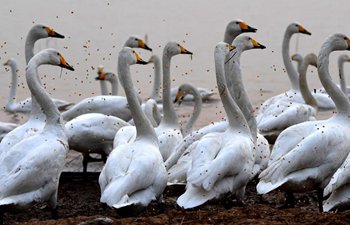SAN FRANCISCO, Dec. 5 (Xinhua) -- Scientists are now working day and night at a major observatory in western California, the United States, in search for new secrets including possible life beyond planet Earth, Elinor Gates, an astronomer at the University of California Observatories said Tuesday.
"Perhaps we haven't discovered any yet (of the signals from other potential civilizations), we're making new discoveries here at Lick Observatory all the time," said Gates, a staff astronomer who has been working for 19 years at the Lick Observatory in east San Jose, about 86 km southwest of San Francisco in California on the U.S. west coast.
Gates's job is part of the Breakthrough Listen Initiative (BLI), funded by the Breakthrough Prize Foundation, which is the most powerful, comprehensive and intensive scientific search ever undertaken for signs of intelligent life beyond Earth.
The project is using the Green Bank radio telescope in West Virginia of the United States and the Parkes Radio Telescope in Australia to search for radio transmissions from advanced civilizations.
The Automated Planet Finder at Lick Observatory, a mountain-top astronomical facility owned and operated by the University of California, is also used for the BLI mission to search for intelligent extraterrestrial life.
"We're making new discoveries here at Lick Observatory all the time, and we use the telescope like that Automated Planet Finder to discover new Supernova, (and) that happens on a regular basis," she said.
The U.S. scientist said she and her colleagues have been working to look for signs of other planets themselves -- "signs that there might be a civilization that is transmitting in this case using labels that they might be communicating between themselves, or maybe deliberately sending a message to us that we might understand, a question that has been asked since the 1960s."
Gates and her team will work for nearly four months or one third of the year-long workload each year for the specific goal of the BLI program and share the data they have obtained at Lick Observatory with other scientists teamed up under the BLI initiative.
The Breakthrough Prize Foundation announced Sunday the winners of the 2018 Breakthrough Prizes in fundamental physics, life sciences and mathematics, together with several other prizes to encourage young scientists in Silicon Valley in San Francisco. Each prize carries an award of 3 million U.S. dollars, and 12 Breakthrough Prize winners shared a total of 22 million dollars to honor their achievements made in scientific advances.
One day after the awards ceremony, the 2018 Breakthrough laureates and other scientists delivered Monday short seminars and panel discussions to the general public at Stanford University, focusing on near-term milestones and potential advances in fields such as fundamental physics, life sciences and mathematics, which could take place within the next decade.
The topics also touched upon pressing problems in the current world, like climate change and global warming.
Joanne Chory, one of the world's prominent plant biologists from the U.S. Salk Institute for Biological Studies, who shared the 2018 Breakthrough Prize in Life Sciences with four other scientists, addressed the seminar and drew up a blueprint for the audience, a 10-year plan to significantly control global greenhouse gas emissions by means of biotechnology.
She told Xinhua that the world population will grow by 50 percent over the next 40 years, and the global economy will more than double. In the face of the threat of climate change, "Our action or inaction in the next 50 years will determine our fate," she said.
"It's not the heat that kills everything, it is all those extreme climate conditions," she said, adding that there will be a lot of countries where people are displaced because of the rising sea level.
She said people should act now to address the imminent climate threat, and explained her 10-year vision to use genetic technology to trap carbon dioxide underground by up to 80 percent from the current level.
The Breakthrough Prizes, also known as "the Oscars of Science" and worth close to 200 million dollars, honor paradigm-shifting research in fundamental physics, life sciences and mathematics since their inception in 2012.
The awards were created by Mark Zuckerberg, founder of Facebook, and his wife, Priscilla Chan; Sergey Brin, co-founder of Google and his wife, Anne Wojcicki, founder of the genetics company 23andMe; and Yuri Milner, a Russian businessman and philanthropist.



















